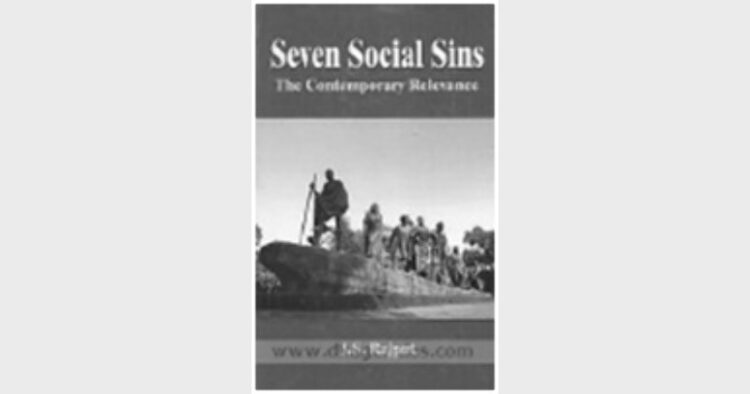Jayant Patel
Seven Social Sins: The Contemporary Relevance, JS Rajput, Allied Publishers Pvt Ltd, Pp 167, Rs 450.00
WRITTEN by an educationist known for introducing reforms in school education, teacher education and institutional management, the author begins by remembering Mahatma Gandhi and his ideals and hopes. Gandhi had said in a letter written on 24 January, 1922 that with acquisition of freedom, India would secure happiness but on becoming independent, all the defects of election system, administration, etc. were likely to arise and as predicted by him, they have done so. He said the only benefit of Independence would be to get rid of slavery and the humiliation resulting from it. To be free from the ills of the societal system, it was necessary for spread of education throughout the country, so that “people could develop from their childhood, qualities of pure conduct, God-fearing love.” He gave three pillars of education – pure conduct, fear of God and love.
Today we have made adequate progress with more and more people are receiving education, but what has happened is that people have started suffering from the craze for consumerism and materialistic possessions. Millions sleep hungry, suffer malnutrition and ill health in severe contrast to the ‘glare’ and glamour of the ‘sole’ possessions of a select few. The author feels that the current tendency to ape the West is proving harmful. “Borrowed ideologies can never be transplanted successfully in an alien climate.”
Gandhiji could visualise what could be the outcome once we became independent and as far back as in 1925, he endorsed Seven Social Sins in his Young India, which speaks of human ignorance that leads to misery inflicted on the vast majority by the privileged few.
In the present era of political climate, with rampant scams and corruption bedevilling all areas of Indian polity and all spheres of private and pubic life, it is felt that eternal values of human life are getting rejected. This is leading to erosion of cultural values. History is witness to the rise and fall of civilisations inextricably linked with the rise and decline of values. The state of contemporary moral degradation and the growing cancer of corruption are threatening to strike a blow at India’s apparent success story. From a small village to global conclaves, politics takes it own toll. In 1925, Gandhiji knew how dangerous the ‘politics without principles’ would be. And this would flourish if ‘education without character building’ was accepted by nations as the only genuine transfer of knowledge from one generation to another.
It would lead to intense desire and greed to acquire ‘wealth without work’. Once these acquisitions became the order of the day, sensual pleasures are likely to become the most favoured pursuits of the resourceful. It would change the character of the market which would be overtaken by new practices in which only ‘commerce without morality’ would rule. In such a scenario, human values would be forsaken in favour of ‘acquisitions and accumulations’ of various varieties. ‘Religion without sacrifice’ shall be practiced just to cover up all that is against social, cultural and ethical practices, which people know but cannot resist trampling these for personal gains.
The inter-linkages among the seven delineated areas promote human growth and participation in acts, activities and initiatives which are organically interlinked. The seven sins are the resolution of human values, ethics, morals in human interaction and man’s approach to nature. This could help create a new world free from hunger, poverty, exploitations, injustice and sorrow and in which everyone lives a dignified life.
(Allied Publishers Pvt Ltd, 1/13-14 Asaf Ali Road, New Delhi-110 002; www.alliedpublishers.com)














Comments